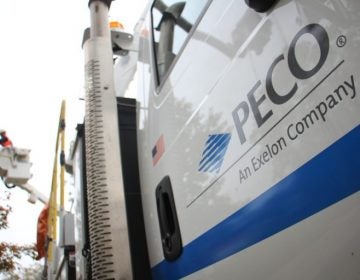Solar co-ops help homeowners harness the sun’s energy
Listen 4:06
Sal Fede displays his new solar panels mounted on the roof of his Philadelphia home. (Joel Wolfram/for WHYY)
Neighbors are teaming up to tackle the challenge of switching to sun-sourced electricty.
Sal Fede’s house isn’t much to look at from the street. With a low roof and a drab-colored wall hiding the windows in the front, it could almost be mistaken for a bunker or a fallout shelter.
“It’s called the ‘backward house’ on the block,” says Fede, who’s 52.
Backward because the front door is down a slope in the rear — perfect for a Philadelphia police sergeant who likes his privacy.
The house is forward-looking in another sense. To see why, you only have to look up at the 34 shiny, brand new solar panels arrayed on the roof. When the mini power plant is connected, it should produce enough electricity to power everything in the house — at least when the sun is shining.
At night or on cloudy days, Fede’s home will draw power from the electrical grid, just like always. And if the system creates excess juice, Fede gets paid to return that power to the utility company.
Fede took the leap into solar after joining an organization of like-minded homeowners: the Northwest Philly Solar Cooperative. A dozen of its members formed a “buying group” to purchase solar hardware in bulk from a local installer, which rewarded them with a modest discount on their systems.
Co-op members also share knowledge and experience and support each through an often complicated process.
Clean energy enthusiasts across the country have formed similar co-ops that help people tackle the challenges of going solar.
“There’s a general feeling in a lot of communities of like, our government isn’t going to do anything, so let’s take matters into our own hands,” says Anya Schoolman, executive director of the Community Power Network in Washington, D.C. Her organization runs programs in six states that have helped people form solar buying groups in more than 90 neighborhoods over the last 10 years.
Schoolman says being an early solar adopter can be daunting.
Installing a solar power system requires homeowners to put down a substantial investment, which they hope will pay off over the long term. But just how quickly they can recoup their money depends on a lot of factors, including government incentive policies that vary from state to state.
Fede’s system cost about $18,000 after the buying group’s discount and a 30 percent federal tax credit. He expects to recover that investment from savings on electric bills within the next 10 years.
On top of the financial investment, homeowners who switch to solar also have to work with their local utility to get the system approved.
“There’s lots of little tiny but very important barriers,” Schoolman says.
For Fede, cleaning up the environment is worth the hassle.
“I realize that it’s almost impossible to do it overnight, but if we all pitch in a little bit here, a little bit there, it becomes just like any endeavor,” he says.
Co-ops are also looking to lower the financial barrier for homeowners whose budgets can’t support a solar investment. At the Northwest Philly Co-op, some members have ideal homes for harvesting sun power but don’t have the money to do it, while other people have the money but lack the right sun conditions.
The group would love to find a way for wealthier members to lend money to the co-op, so homeowners who need a little help buying panels could borrow money at low interest.
The Northwest Philly Co-op is sharing their solar know-how with neighbors across town in West Philadelphia.
A couple dozen solar-curious residents in West Philadelphia gathered in the upstairs office of a natural foods store one evening. Meenal Ravel navigated through a couple websites to show attendees how to check whether their homes have solar potential.
Ravel talked about what’s involved in working with the utility company and fielded questions about costs and financing.
For Ravel, it makes sense that more people are figuring out how to make solar work.
“The physics of the planet is demanding that we learn about our energy needs and think smartly about how we procure it,” she says.
WHYY is your source for fact-based, in-depth journalism and information. As a nonprofit organization, we rely on financial support from readers like you. Please give today.







